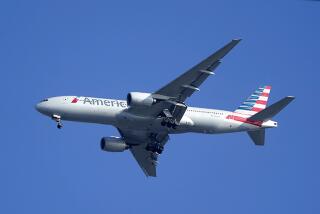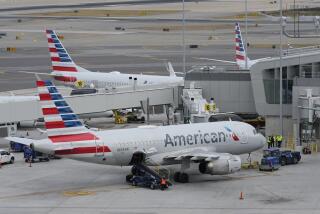FAA reauthorization bill would affect some airline operations
After delaying for more than three years a bill to reauthorize the Federal Aviation Administration, Congress appears ready to adopt legislation that would also make several changes in the way airlines operate.
For example: An amendment to the bill could more than double the number of daily round-trip flights between the western U.S. and Ronald Reagan Washington National Airport, to 28 from 12. Long-distance flights into Reagan National have been limited because of noise concerns and an effort to shift more flights to Washington Dulles International Airport. Airline officials expect nearly half of the new flights to take off from Los Angeles and San Francisco.
Debate over how many flights to allow was among several issues that delayed adoption of the bill.
The bill also includes a provision pushed by Sen. Al Franken (D-Minn.) to prohibit pilots from using cellphones, laptop computers and other personal electronic devices in the cockpit while flying a plane. The proposal was drafted after two Northwest pilots overshot a Minneapolis airport by 150 miles in 2009 because they were distracted by their laptops.
The bill would also give the FAA the green light to modernize the nation’s air traffic control system, upgrading it from the World War II-era radar system to a GPS-based system that FAA officials say could reduce airline delays up to 20%.
“In an industry like aviation, standing still or moving backward is not an option,” FAA Administrator J. Randolph Babbitt recently told a congressional committee.
Among other changes, the legislation calls for a study on flight attendant fatigue. The study was requested by flight attendant unions long before a frustrated JetBlue Airways Corp. flight attendant argued with an unruly passenger, cursed that person over the intercom, deployed the plane’s emergency chute and slid down it — beer in hand.
Congressional leaders hope the president will sign the bill by the end of March.
• Airline employment begins an ascent
After 28 consecutive months of declining employment, the U.S. airline industry is back in hiring mode again, a sign that airlines are ready to add routes and flights.
The airline industry reported a 0.2% increase in employment in December, the first rise since August 2008, according to the latest data from the U.S. Bureau of Labor Statistics.
“I think the airlines are moving up with the general economy,” said Jan Brueckner, an economics professor at UC Irvine and expert on the airline industry.
American Airlines announced last week that it plans to hire up to 30 bilingual flight attendants for its new Los Angeles-to-Shanghai route. The route will serve the growing tourism and business travel from China over the next few years as the Chinese middle class grows and travel restrictions ease. The new American hires are in addition to the 568 flight attendants recalled to work by the airline this month.
• Airlines seek answers from Watson
The technology that allowed a supercomputer to beat two former quiz show champions in the first human-versus-computer “Jeopardy!” match might also help airlines operate more efficiently and aid passengers in booking travel plans.
The IBM technicians who built the question-answering computer named Watson say they are talking with several U.S. and international airlines about using the technology. IBM officials declined to name the airlines.
One situation in which a supercomputer could help is if several planes have landed at an airport but only one gate is available. The Watson technology could determine which arriving plane has the most passengers with impending connections so it could be unloaded first, said Raul A. Arce, IBM’s vice president for travel and transportation.
In the next five to 10 years, Arce said airlines and hotels could also use Watson technology to suggest travel plans for passengers by simultaneously analyzing hundreds of streams of data, including flight schedules, airline ticket prices, hotel rates and personal preferences.
Arce said: “The Watson technology can make it easy for them by going through all of this data and giving them the best alternatives.”






